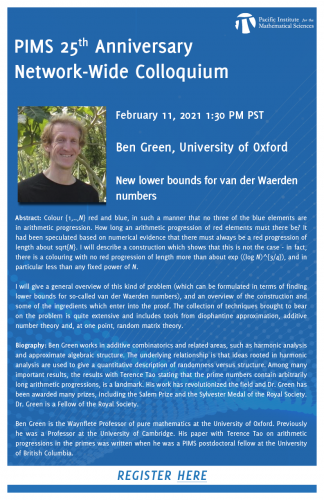PIMS 25th Anniversary Network-Wide Colloquium: Ben Green
Topic
New lower bounds for van der Waerden numbers [Video]
Speakers
Details
Abstract:
Colour {1,..,N} red and blue, in such a manner that no 3 of the blue elements are in arithmetic progression. How long an arithmetic progression of red elements must there be? It had been speculated based on numerical evidence that there must always be a red progression of length about sqrt{N}. I will describe a construction which shows that this is not the case - in fact, there is a colouring with no red progression of length more than about exp ((log N)^{3/4}), and in particular less than any fixed power of N.
I will give a general overview of this kind of problem (which can be formulated in terms of finding lower bounds for so-called van der Waerden numbers), and an overview of the construction and some of the ingredients which enter into the proof. The collection of techniques brought to bear on the problem is quite extensive and includes tools from diophantine approximation, additive number theory and, at one point, random matrix theory.
Speaker Biography:
Ben Green works in additive combinatorics and related areas, such as harmonic analysis and approximate algebraic structure. The underlying relationship is that ideas rooted in harmonic analysis are used to give a quantitative description of randomness versus structure. Among many important results, the results with Terence Tao stating that the prime numbers contain arbitrarily long arithmetic progressions is a landmark. His work has revolutionized the field and Dr. Green has been awarded many prizes, including the Salem Prize and the Sylvester Medal of the Royal Society. Dr. Green is a Fellow of the Royal Society.
Ben Green is the Waynflete Professor of pure mathematics at the University of Oxford. Previously he was a Professor at the University of Cambridge. The paper with Terence Tao on arithmetic progressions in the primes was written when Ben Green was a PIMS postdoctoral fellow at the University of British Columbia.
About the PIMS Network-Wide Colloquia:
Starting in 2021, PIMS has inaugurated a high-level network-wide colloquium series. Distinguished speakers will give talks across the full PIMS network with one talk per month during the academic term. The 2021 speaker series is part of the PIMS 25th Anniversary showcase.
Additional Information
Time:
All network wide colloquia take place at 1:30pm Pacific Time
Registration:
To attend this event and others n the series, please register here.
This event took place via zoom and a recording is available on mathtube.org.
Ben Green (Oxford)

